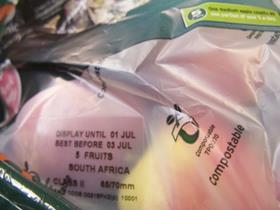
Replacing ‘use by’ labels with ‘best before’ and offering better freezing guidelines on packs has helped consumers reduce food waste, a new Wrap survey has found.
The body’s Retailer Survey found that confusing multiple date labels have been “mostly removed”, but there is more work to be done on guidance about fridge temperatures.
While households are making ground in reducing edible food waste, a further 350,000 tonnes could be saved, worth an estimated £1 billion annually, through further changes to packaging and labels on key food items.
Wrap director Steve Creed said: “We know that changes to packs and labels, which give clarity around date and storage options, can have a dramatic effect on how much good food ends up in the bin so getting the right messages in place is critical.
“Our report shows a mixed bag in terms of overall results. There are areas where good work continues to make a real difference and others where there is room for improvement. These insights provide a crucial snapshot of what industry is doing, and where more work is needed.
“They will help us drive forward change under Courtauld Commitment 2025, and will play a big part in re-energising the stall in household food waste reduction, that we recently identified. In fact, we are in discussions with the sector about trialling practical solutions that focus on making advice on storing and using our food as clear as possible.”
The number of products found to have two date labels fell from almost 40 per cent in 2009 to less than three per cent in 2015, as multiple labels have been found to confuse shoppers.
More action is needed around freezing guidance, Wrap said, and there is an “urgent need” to reinforce the value of the Snowflake logo to show suitability for home freezing on packs.
Other findings of the report included:
Most products now carry storage guidance consistent with Wrap recommendations but action is needed on bread and potatoes.
Only a third of UK fridges are set within the recommended temperature range (below 5 degrees), and another third operate above 9 degrees. Helping consumers to choose the correct temperature could add an average of three days extra to shelf life.
There has been an increase in the availability of smaller pack options in a number of categories such as bagged salads, pre-packed apples, carrots, and potatoes.
Chairman of the Food Standards Agency Heather Hancock said: “The findings from this survey are very encouraging, but I think that there is still more that can be done, which is why the FSA is working closely with WRAP on updating the guidance on the application of on pack dates and related storage advice.
“I believe it is important that information available on pack not only helps to ensure people have safe food, but that it makes it as easy as possible for them to manage and store their food to ensure less is wasted.”






No comments yet